Atlanta’s Kosher Classics
Five kosher establishments set the standard by which others would follow from brisket to bourekas.
Chana Shapiro is an educator, writer, editor and illustrator whose work has appeared in journals, newspapers and magazines. She is a regular contributor to the AJT.
Siegel’s
Full-service kosher restaurant: 1930s to 1950s
Raizel and Jacob Siegel
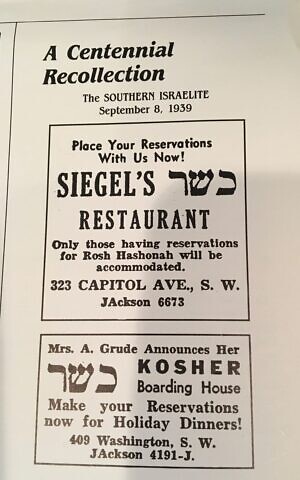
From the mid-1930s until the early 1950s, Siegel’s was the place to go for a delicious European-style fleishig (meat) meal. Its most well-known location was a large wooden house with a wrap-around porch on Capitol Avenue across the street from the Jewish Educational Alliance, which predated Atlanta Jewish country clubs and the Atlanta Jewish Community Center, and was the site of English-language classes for immigrants.
Siegel’s had two large dining rooms that were always crowded on Sunday, their busiest day. The restaurant was unpretentious, with unmatched chairs and simple wooden tables, yet for Jews in Atlanta and those visiting from other cities, it offered the luxury of “eating out” in a kosher restaurant.
Siegel’s was open for lunch and dinner Sunday through Thursday and catered for simchas at then-Orthodox congregations Shearith Israel and Ahavath Achim.
Owners Jacob and Raizel Siegel took turns cooking in the kitchen and waiting tables while mixing with the customers in front.
Grandson Murray Siegel remembers that one of the waitresses had been with the Siegels so long, she conversed with them and customers in perfect Litvak-accented Yiddish. He also recalls his grandparents preparing a bountiful kiddush for his bar mitzvah at Congregation Ahavath Achim, when it was on Tenth Street, and he fondly recalls the large family Passover seders, which took place in his grandparents’ restaurant.
“Our whole extended family was there, and my Bubbie and Zaydie did all the cooking. There was usually another family there, too, who ran their own seder, while my grandfather led ours, going a mile-a-minute, entirely in Hebrew. It was memorable; a big thing!”
Bernie the Baker
Sabbath-observant, kosher-certified bakery: 1970s to 2000
Bernie Idov
Bernie Idov grew up in an Atlanta family of heimishe (folksy) cooks and bakers, and most of his recipes were adapted from those of his mother and grandmother. He also recalled recipes from the Old King Cole bakery, from his childhood, whose baker helped Idov with facets of the baking industry and in selecting equipment for his home bakery.
“I ventured into the baking business in the late 70s, after Manhattan Bakery closed, because I felt that our community needed quality kosher-certified baked goods. I baked for kiddushes in Congregation Beth Jacob’s kitchen and provided baked goods for Sally Hillsman, who catered for the Atlanta Jewish Federation. Needing more space, I set up a professional operation in my home basement and quickly gained a customer base,” he said.
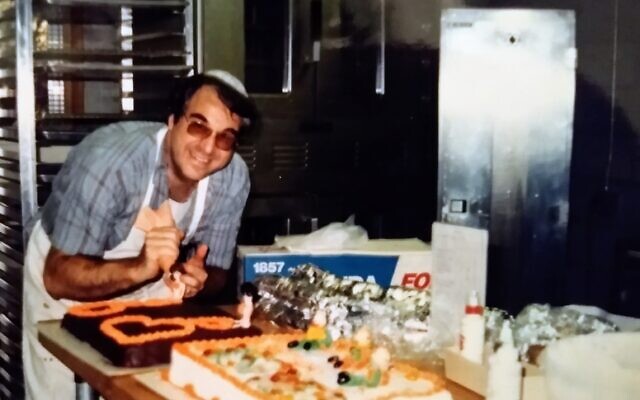
“My primary business was with major Atlanta synagogues (including Ahavat Achim, Or VeShalom, Shearith Israel, B’nai Torah, Chabad of Georgia) and the kosher hotels (Peachtree Plaza, Crowne Plaza Ravinia, Doubletree Concourse Perimeter, Marriott). I baked bread for Harry Baron’s delicatessen in Phipps Plaza, high holiday challahs for suburban Kroger and Publix supermarkets, and filled weekly challah orders for customers who picked up orders from my basement and later from my store. I also supplied both the Greenfield Hebrew Academy and Torah Day School of Atlanta with a weekly order of challahs (I included a weekly printed d’var Torah) for students to take home for Shabbos.”
Idov opened a popular bakery in the Toco Hill Promenade in 1990, which he closed in 2000 to focus on raising his children. Popular items included apple strudel and old-fashioned sourdough rye bread, and Atlantans remain nostalgic about his challah and black and white cookies. Bernie the Baker’s fans included prominent rabbis and visitors from cities with kosher bakeries, who stocked up on his challahs and specialties to take home with them.
Norm’s Place
Toco Hills’ kosher restaurant since the 1950s: 1980 to 1983
Norman and Lydia Schloss
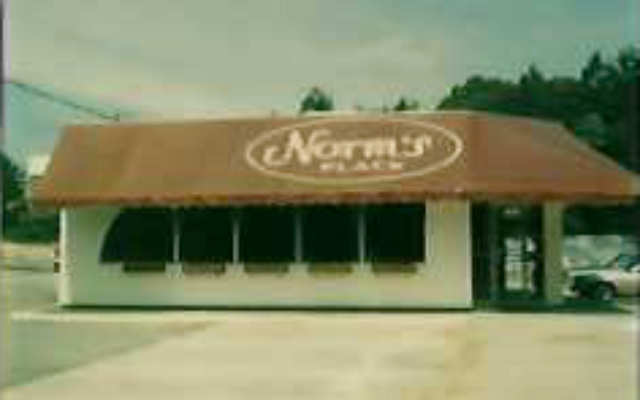
Norman and Lydia Schloss opened Norm’s Place, a full-service kosher restaurant on Briarcliff Road, in 1980. The New Yorkers were well-seasoned in “kitchen culture.” As a teen, Lydia worked at Camp Moshava in Indian Orchard, Pa., where she cooked three meals a day for 500 campers all summer. Norman mastered kitchen management working for the National Council of Synagogue Youth on weekends. “For years, I’d get a call on Monday, rent a truck to pick up food for 200 to 250 kids, and set up and manage kitchens for all meals at teen Shabbat retreats all over the northeast, from Wilmington, Del., to Bangor, Maine.”
Lydia’s sister Evi, a friend of Norman’s, lived in Atlanta. She introduced them, and Norm summarizes their frequent visits, “We liked what we saw!” However, it took the New York City blackout of 1977 to convince the newly married couple to decide to leave. In Atlanta they rented a two-bedroom apartment with a swimming pool for half the rent they had paid for a one-bedroom in New York. They soon accepted leadership roles in the Orthodox community and decided to respond to one of its needs, a full-service kosher restaurant.
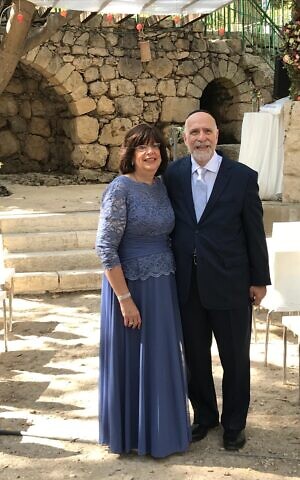
Norman tells their story:
“We lived in Atlanta for two years before opening Norm’s Place. Herb Black, of blessed memory, and Rabbis Emanuel and Ilan D. Feldman, oversaw our kosher certification. Supreme Foods in Atlanta and Quality Frozen Foods in New York were our suppliers, and we also got meat from Arthur Strauss’ and Bernie Russo’s Atlanta kosher butcher shops,” Norman Schloss said.
“Norm’s Place was a family-oriented restaurant, with good, old-fashioned Jewish cooking. And we offered takeout and catering. I was the maître ‘d and front counter person, and Lydia ran the kitchen. (Atlantans can now sample her culinary talent with food she prepares at The Spicy Peach). We were open and successful for three years, but closed due to a medical situation. Norm’s Place provided food for many happy occasions, from brises to bar mitzvahs, in which we were fully involved.
“My most touching moment was when we closed and a customer said to me, ‘Your restaurant made it easier for me to start and maintain a kosher home.’”
Eden’s Café and Catering
Atlanta’s vegetarian kosher restaurant
Rica Sabetai and Donna Sabetai Krombach
Eden’s Café and Catering, in the Briar Vista Shopping Center, opened in 1984 for lunch and dinner and for private parties of up to 60 people. It hosted engagements, birthday parties and even a couple of weddings, however most of Eden’s business was delivery, takeout and catering. Eden’s was primarily a Mediterranean, Middle Eastern-style restaurant in which many of the menu items had a Greek Sephardic touch.
Donna Sabetai Krombach remembers, “We were a family business, with my mother as chef, using her recipes from Salonica, Greece. We were also a pizza restaurant, with vegetarian dishes and vegan specials, everything made from scratch. We offered salads, falafel, pita wraps, pizza with 16 different toppings, fresh fish, bourekas, lasagna, moussaka and sandwiches. If we didn’t have it, we’d find a way to make it for our customers, serving a lot of things daily that were not on the menu,” Krombach said.
“Our dessert case held kourabiedes (butter cookies), rosquitas (a twisted cookie) and pastries made with phyllo dough. We baked chocolate chip cookies in the pizza ovens hourly, while my mom made baklava in the kitchen.
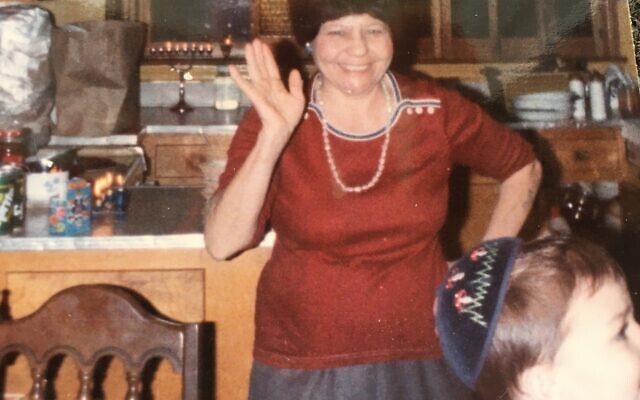
“Mom cooked for synagogues, friends and private parties. Everyone knew her as ‘Mama,’ and whatever she cooked had a Greek touch. Egg bread, tsoureki, came out of the oven every few hours. Customers bought the whole pan; we couldn’t make it fast enough,” Krombach continued. “Every day, when my father Mike closed his barber shop around the corner, my mom had family dinner ready on a restaurant table. You could find him in the back of the store, playing his bouzouki and dancing with my mother and son, Shmuli.”
Eden’s Café closed in 1989, having been featured in Creative Loafing and other local papers. Combining kosher and vegetarian, it attracted Jews, vegans, Emory University students, Muslims, Ethiopians and Greek families. In 1986, WAGA-TV, channel 5, named it Best Pizza Place in Atlanta.
Chai Peking
Atlanta’s kosher Chinese restaurant
Reuven Michoel Robbins
Reuven Michoel Robbins, by his own count, worked in at least six different retail venues before venturing into the food business, in which he had no hands-on expertise. After a couple of years exploring the novel idea of Chinese food for Atlanta’s kosher community, in the late 1990s he was ready for some test runs.
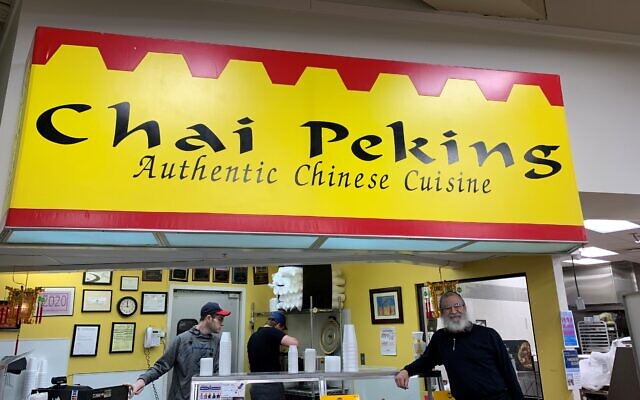
To gauge peoples’ reaction, Robbins organized two fund-raising dinners at Congregation Beth Jacob.
A prominent Atlanta rabbi called his idea a “pipe dream,” and a well-respected local journalist tried to dissuade him, reasonably citing the failure of past attempts to sustain kosher eateries in Atlanta.
Robbins was undaunted. Chai Peking opened in 1997 and has flourished for 24 years. In a New York Times best-seller, “The Fortune Cookie Chronicles,” Robbins was interviewed about Chai Peking, which is touted as the only place to buy kosher Chinese food between Maryland and South Florida.
Robbins candidly tells his story:
“There were obstacles, but I believed that I could run a first-of-its-kind kosher place. With a loan from Wachovia Bank who believed in my concept, and my own determination, I wanted to make it easy for more people to keep kosher or try kosher, while enjoying Chinese food. Jews like Chinese food! And I was confident that I could make a living.
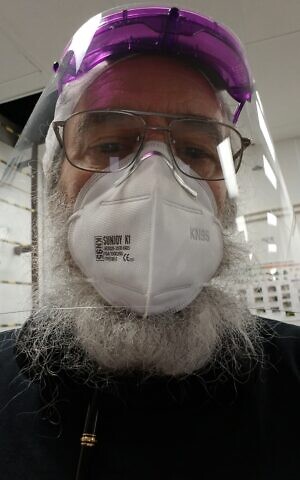
“I also understood that offering only take-out would help me succeed. My prices would be lower than a sit-down place, and I’d have the advantage of shoppers picking up a kosher Chinese meal while they did their marketing. The Kroger in the Toco Hills Shopping Center was–and still is–the perfect spot for Chai Peking,” he said.
“My longtime friend, Danny Eng, who owned the popular Lotus Garden restaurant on Buford Highway, was a valuable consultant. He recommended Chinese cooks, one who has been with me for 23 of my 24 years in business. I’ve added items and deleted items from the menu, dropping fortune cookies and adding Chinese hot dogs, for example. I try to respond to reasonable customer requests and to accommodate customer food issues, like allergies and food intolerances,” Robbins said.
“My intention is to find the right buyer to take over my business, maintain food quality and cheerfully serve my customers. As soon as that happens, I’ll head to Israel, where I’ve always planned to live, spend time with friends, finally not stand on my feet all day, and study Torah.”
- Kosher
- jewish atlanta
- Siegel’s
- Jewish Educational Alliance
- Atlanta Jewish Community
- immigration
- Jacob and Raizel Siegel
- Yiddish
- Congregation Ahavath Achim
- Passover
- Bernie the Baker
- Atlanta
- Bernie Idov
- Congregation Beth Jacob
- Ahavat Achim
- Or VeShalom
- Shearith Israel
- B'nai Torah
- Chabad of Georgia
- Harry Baron’s delicatessen
- Phipps Plaza
- Torah Day School
- Norm’s Place
- Norman and Lydia Schloss
- Eden’s Café and Catering
- Donna Sabetai Krombach
- Chai Peking. Chinese food
- Reuven Michoel Robbins
- Greenfeld Hebrew Academy



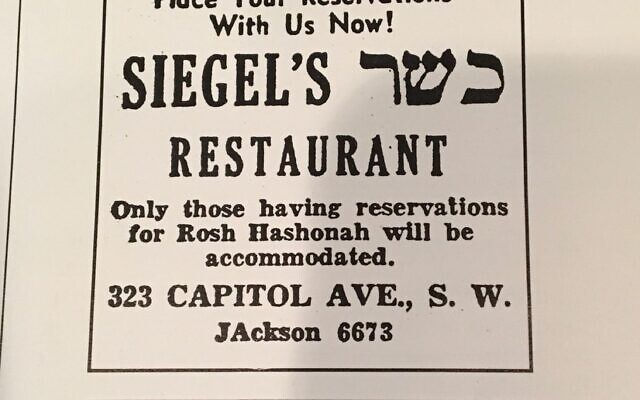
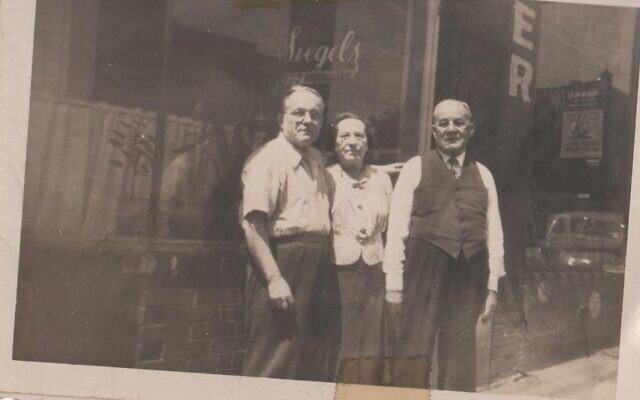
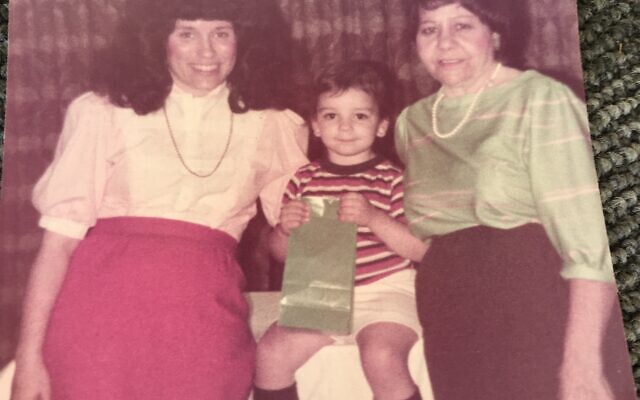
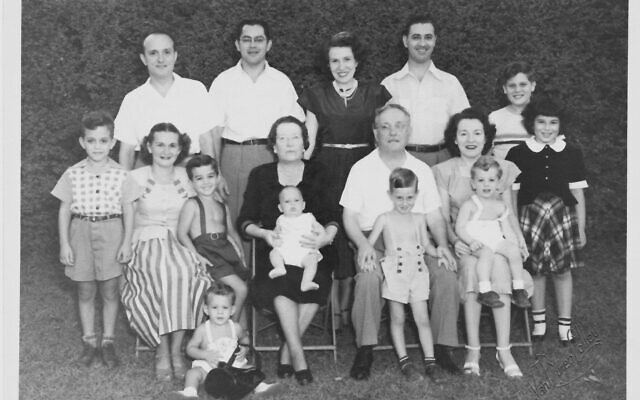
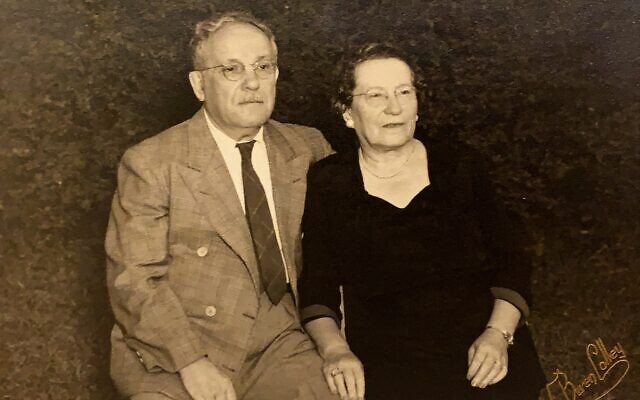
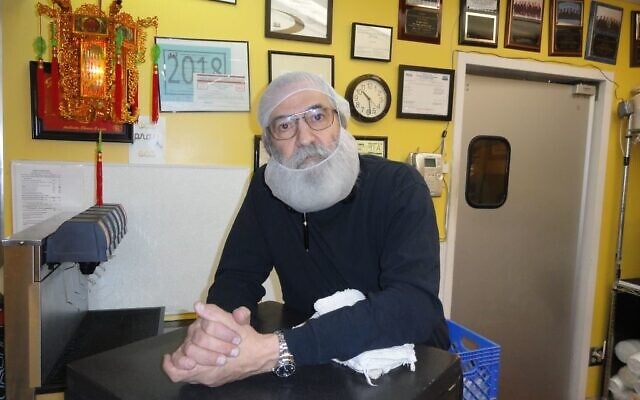
comments